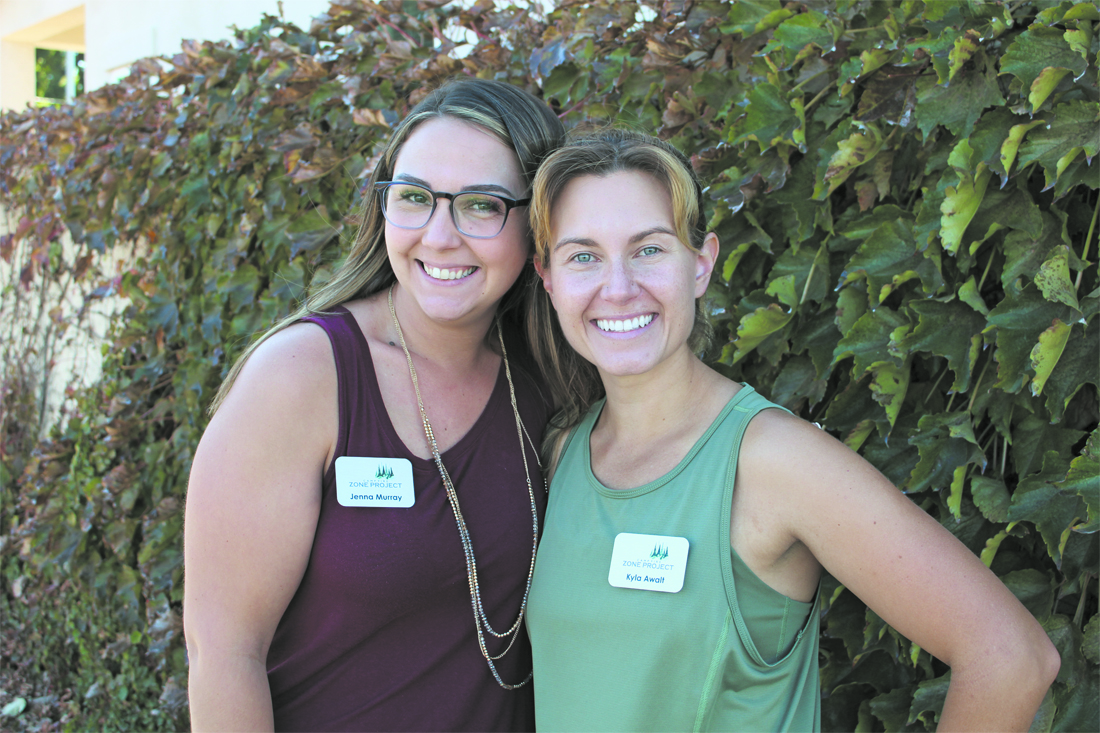
Photo by Ashiah Scharaga
Jenna Murray (left) and Kyla Awalt launched the Camp Fire Zone Project in March to help the Ridge rebuild and stay connected.
For Kyla Awalt, Paradise has felt like a “small, isolated, lonely town” for much of the past year. She’s experienced this firsthand—her family’s home in central Paradise survived the Camp Fire.
Awalt felt compelled to help her burned-out neighbors and give them hope. So, early this year, she attended a conference in Santa Rosa and learned about a block captain system that has helped that city’s neighborhoods rebuild and stay connected in the wake of the 2017 Tubbs Fire.
She was inspired by what she learned. She called her realtor, Jenna Murray, whom she described as “super tenacious,” and the duo launched the Camp Fire Zone Project in March. It has a fund set up at the North Valley Community Foundation to take donations.
The pair created 33 zones encompassing the entire burn scar, including Magalia, Concow, Yankee Hill, Butte Creek Canyon, and so on. In each, there are multiple captains who serve as advocates and a “voice for the zones,” Awalt said. When a problem arises, these community leaders figure out how to solve it. They’re a triple-threat: an informational resource, a neighborhood event planner and a government liaison.
Awalt and Murray—president and executive director, respectively—manage the project and also are zone captains. It’s largely up to each zone’s members as to how active they’d like to be, Awalt said. Many meet regularly and several already have spearheaded projects in their neighborhoods. In one zone, members built a community shed for residents to store and share tools. In another, they designed a resource house—similar to a little free library. Inside is a binder full of information for survivors, a notepad for jotting down questions or messages to neighbors, and captain contact information.
The zone project has provided cost savings as well. Murray rallied her neighbors in zone 3 (in eastern Paradise) and scheduled 12 parcel surveys at once. Instead of charging over $2,000 per household, each price tag came to $780, she said. In other zones, captains have scheduled tree removals and water sampling in a similar fashion, saving their neighbors time and money.
Local organizations and agencies have taken notice of the project. Murray and Awalt said the zone captains are working with the Paradise Adventist Church and Love Paradise to build sheds for survivors who need to store their belongings this winter. The Paradise Police Department also is partnering with the zone project, funded by a $10,000 grant from Farmers Insurance.
Paradise Police Chief Eric Reinbold says he envisions the partnership providing opportunities to improve the safety and security of the town. Connections between the zone captains and officers can help the department respond more proactively, he said. This will be valuable as the town rebuilds and people move back, because there will be “more eyes out there” and more people “empowered to report” things that don’t look right in their neighborhoods.
For example, the grant could fund installation of security cameras if a trail or area of town is having issues with trespassing or petty theft. But Reinbold is supportive of the grant potentially funding community outreach as well, such as zone barbecues to bring residents together.
“It’s a good opportunity because you have a core of people that you can either get information transferred both ways or kind of learn what the concerns are out in the community,” he said. “The more we know about what’s going on out there before it becomes a big issue, the better we can head those potential problems off.”
Awalt and Murray told the CN&R they want the project to continue to grow, and eventually become a model for other disaster-impacted communities. They see it as an important part of the rebuild and recovery of the region.
“We want our community back,” Awalt said. “We really want the community members to feel like they’re cared about, they’re loved, there’s support.”
Murray, who lost her home and temporarily relocated to Chico with her family, says there’s no place like Paradise. After the disaster, there was so much confusion and misinformation about what would come next that she wanted to do her part to help.
“Paradise was not going to do it on its own,” Murray said. “We do have excellent community members, but it’s really important to note that a lot of the people that were part of our community were on the older side.”
For Carrie Fritsch, a captain for zone 11 in southern Paradise, the Camp Fire Zone Project has already accomplished what Awalt and Murray intended. Fritsch, who was born and raised in Paradise, said five out of six of her family members lost their homes in the fire. Though she has been living in Chico with her husband and daughter, the zone project has helped her stay connected. In fact, she’s become close with Ridge neighbors she didn’t even know before the fire.
“Everyone’s really watching out for each other and communicating more than they ever have been,” she said. “If there’s an issue that comes up, everyone’s really eager to help.”
She recently organized a fundraiser to install a memorial for the four residents in her zone who perished in the fire and was “blown away” by the support she received. She’s also organized zone parties, which her neighbors have told her have been “really meaningful” because they have brought those living there together with those who are planning to move back.
“[The Camp Fire Zone Project] really makes a strong foundation for the next chapter of our community, I think,” Fritsch said. “There’s just a really good feeling of ‘we’re all in this together, no matter what your situation is personally.’”
